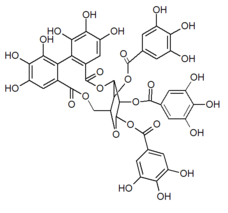Punicafolin facts for kids
Quick facts for kids Punicafolin |
|
|---|---|
 |
|
| Other names | 1,2,4-tri-O-galloyl-3,6-(R)-hexahydroxydiphenoyl-β-D-glucose |
| Identifiers | |
| CAS number | |
| PubChem | |
| SMILES | Oc4c(O)cc(cc4O)C(=O)OC6C(OC(=O)c(cc1O)c-5c(O)c1O)C(OC(=O)c(cc7O)cc(O)c7O)C(OC(=O)c(cc3O)cc(O)c3O)OC6COC(=O)c(cc(O)c2O)c-5c2O |
| Properties | |
| Molecular formula | |
| Molar mass | 0 g mol-1 |
| Except where noted otherwise, data are given for materials in their standard state (at 25 °C, 100 kPa) | |
Punicafolin is a special natural chemical. It belongs to a group called ellagitannins. These are compounds found in many plants.
Punicafolin is found in the leaves of the Pomegranate plant. This is the same plant that grows the yummy fruit. It is also found in another plant called Phyllanthus emblica.
What is Punicafolin?
Punicafolin is a type of ellagitannin. Think of it as a complex molecule made by plants. It is similar to other ellagitannins like tellimagrandin II. It is also like a molecule called nupharin A.
How is it Different?
Even though it's similar, Punicafolin is an "isomer" of these other chemicals. This means it has the same basic parts. But these parts are arranged in a different way. Imagine building blocks that can make different shapes.
What is Punicafolin Used For?
Scientists have studied Punicafolin. They want to learn more about its effects. Research has shown that it might have helpful properties.
Studies in Animals
For example, Punicafolin has been studied in dogs. These studies looked at its potential to help with certain health issues. Scientists are still learning about how it works.

